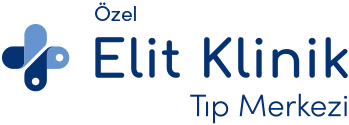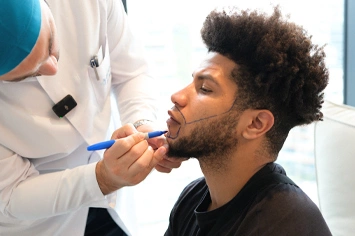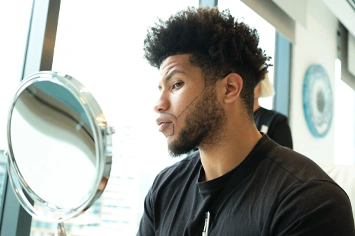Beard and Mustache Transplantation Clinic in Kagithane Istanbul

Beard Transplantation at Elit Klinik
The Most Effective Beard Transplant
How Is Beard Transplantation Done?
Elit Klinik Best Beard Transplant
Beard Transplantation with DHI Technique
What are the Advantages of DHI Beard Transplant?
Mustache Transplantation Treatment Istanbul 2024
What is the Mustache Transplant Process?
Most Effective Mustache Transplant
How Is Mustache Transplantation Done?
Beard and Mustache Transplant Frequently Asked Questions
Beard transplantation
- seeking treatment for the root canal,
- the appearance of a sparse beard,
- It is suitable for anyone who experiences incomplete beard growth and desires an aesthetically bushier beard.
Yes, beard transplantation is now possible. Beard transplantation is an aesthetic procedure often applied to individuals who experience sparse or incomplete beard growth.
This procedure, performed by specialist doctors, is usually performed under local anesthesia. With the modern Sapphire FUE technique aims to achieve natural results.
Yes, beard transplants and beard transplant recipients are generally healthy. When done under expert control and sterile conditions, the process is quite safe. Uygun bakım ve danışmanlık önemlidir.
Yes, beard transplants are usually permanent. However, proper care and healthy lifestyle factors after transplantation can also affect permanence. Beard transplantation performed under the guidance of a specialist doctor usually offers long-term and satisfaction-guaranteed results.
After beard transplantation slight swelling and redness can be seen. Hair loss may occur in the first days, but this is normal. The healing process is completed within a few days and the transplanted hairs gain a natural appearance over time.
Beard transplant prices vary according to the number of grafts to be transferred, the hair transplantation technique to be used and the condition of the region. All procedures performed in the beard transplantation center dermatology unit is realized with support and has an affordable price.
Mustache transplantation is applied to men who have a deficiency in the mustache area due to trauma or who are looking for a solution to the problem of sparse mustache.
Yes, it is now possible to have a mustache transplant. Moustache transplantation can be performed on any man who has sparse moustaches and has completed their development.
Beard and moustache transplants are a way to help people grow hair on their face that may be sparse or missing. Hair transplant specialists take grafts from the donor area and move them to the beard and moustache area using special instruments. This can be really useful for people who are unable to grow facial hair due to their genes or who have scars or burns. The two popular methods used for this are called FUE (Follicular Unit Extraction) and DHI (Direct Hair Implantation).
Beard and moustache transplantation is for people who do not have a lot of facial hair and who wants a bushier beard is applied to men. Some men may have genes, scars or burns. Those who want to make their beard and mustache look thicker and bushier can have this procedure.
When you have a beard or mustache transplant, to ensure that you feel no pain while the doctors work local anesthesia they use. You may feel some discomfort or pain after the procedure, but it usually goes away within a few days. You can take easy medicines to help with any pain. Do not worry if your skin becomes a little swollen or red after the transplant, as this is normal.
After beard and mustache transplantation first results 3-4 months after planting will emerge. However, to see full and lasting results, it is usually 9 to 12 months you have to wait.
The number of grafts in beard/mustache transplantation depends on the facial structure of the person, the size of the area to be transplanted and the desired density.
Typically for beard transplantation 1,500 to 3,000 graftsand in mustache transplantation 400 to 800 grafts is transplanted. If the area without beard or mustache is large, more transplantation may be required. You can decide on the area to be transplanted together with the hair transplant specialist.
FUE and DHI techniques When FUE is used, very small white spots may remain in the donor area, but these are not visible. Since the FUE method is a minimally invasive technique, the possibility of scarring is very low. Since the area where the graft is placed in facial hair transfer heals very quickly, there is usually no scar.
The healing process varies from person to person. In the transplantation area crusting usually falls off within 7 to 10 days and the skin returns to its normal appearance. There may be mild redness and swelling in the first few days.
After the crust formation is completed, the treated area returns to normal. Full recovery may take 2 to 3 weeks.
It is very important to follow your doctor’s instructions after the procedure. After the transplant, you should clean your face by following your doctor’s instructions wash gently and ewho must keep the area clean.
You can clean the area with the antiseptic solution and shampoo recommended by your doctor and use a light moisturizer. Avoid scratching your face in the first days and avoid putting pressure on your beard or mustache area for at least two weeks.
Beard and mustache transplants, depending on the number of grafts transplanted 3 to 6 hours lasts. This period varies according to the facial structure of the person and the area to be transplanted.
Since the transplant is performed under local anesthesia, you can return to your daily life after surgery, but bed rest is recommended.
Yes, the first few days after surgery swelling is normal. Mild swelling may occur, especially in the transplant and donor areas. This swelling usually decreases and disappears completely within 3 to 4 days. Applying a cold compress can help reduce swelling.
In general, to shave after transplantation You have to wait 3 weeks. This period allows the newly transplanted graft to take root and heal. When you shave for the first time, it is important to shave gently, using the shaving method recommended by your doctor.
Instead of a razor scissors we recommend you to use it.
Recovery after beard or mustache transplantation it is normal to feel itchy. Itching may be felt in the area, especially if the crust has formed. In this case, it is very important to prevent scratching. You can use lotions or sprays recommended by your doctor to relieve itching.
After the operation, some of the transplanted hair will fall out in the first few weeks. This is normal and ” shock spill” is called “shock hair loss”. After shock hair loss, the hair grows back and becomes permanent.
Your doctor may recommend antibiotics and painkillers to speed healing and prevent infection after the procedure. You can also use disinfectant or moisturizing lotion to keep the area moist and clean. All medicines should be used as prescribed by your doctor.
Facial redness after beard or mustache transplantation is usually Disappears in 1 to 2 weeks. Hassas ciltlerde bu süre biraz daha uzun sürebilir ancak zamanla tamamen ortadan kalkacaktır.
To get rid of the rash quickly, it is important to keep the area clean and follow the care recommended by your doctor.
Yes, beard and mustache transplants by experienced professionals a natural look provides. Since the hair follicles are transplanted according to the person’s face shape and the direction of hair growth, the result is quite natural. After the healing process is completed, the transplanted hair will start to grow like a natural beard.
The price of beard and mustache transplantation may vary depending on the number of grafts to be transplanted, the area to be transplanted and the technique used.
Beard transplant prices in Istanbul are usually Between 20.000 TL and 50.000 TL is changing.
Most people express their satisfaction after beard and mustache transplantation. Beard and moustache transplantation allows men to enhance their masculine image. Especially a bushy and neat beard increases facial attractiveness and self-confidence in men.
Natural and permanent results after transplantation meet people’s aesthetic expectations.
Yes, beard and mustache transplants are permanent. After the surgery, the transplanted hair follicles are firmly rooted and continue to grow throughout your life. These hairs will grow after the transplant and will adapt to your natural beard.
Beard Transplant
Saniyeler içinde formu doldurun. Size yardımcı olalım.rn



